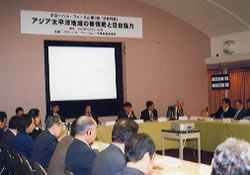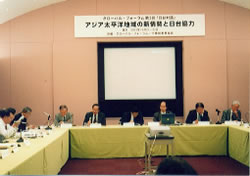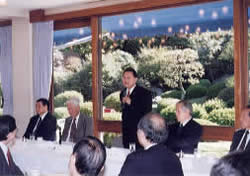International Dialogue
Summary of Dialogues
The Third Taiwan-Japan Dialogue Convened
"Current Affairs in Asian Pacific Regions and Cooperation between Taiwan and Japan"
The Global Forum of Japan (GFJ) and Taiwan's Foundation on International and Cross-Strait Studies co-organized the Third Taiwan-Japan Dialogue on the themes of "Current Affairs in Asian Pacific Regions and Cooperation between Taiwan and Japan" on October 23-24, 2003 in Tokyo. After a welcome dinner on the evening of October 23rd, hosted by GFJ Chairman Okawara Yoshio, a lively full-day discussion on the 24th amongst the 72 participants from Taiwan and Japan ensued. Prof. Ito Kenichi, Governor and Executive Director of GFJ, hosted a closing dinner on the evening of the 24th as well.
 |
International Cooperation and Security
Session I of the 23rd was chaired by Prof. Jimbo Ken, Chief Researcher of the Japan Forum on International Relations, with the theme "International Cooperation and Security" being deliberated. Dr. Ijiri Hidenori, Professor, Tokyo Foreign Languages University, began proceedings with his keynote speech in which he stated that, "China's Taiwan policy is becoming more flexible, as seen in cases as Jintao Ziem's speech at last year's Sixteenth General Party Assembly, where he seemed to accept the 'equality' between the Continent and Taiwan by stating that, 'the Continent and Taiwan both belong to one China.' At the same time, we can see a new approach by China in which she is putting pressure on Taiwan through the United States." Mr. Song Yann-huei, Researcher at the Institute of European and American Studies delivered the second keynote speech. Mr. Song stated that, "PSI (Proliferation Security Initiative), which the US proposed in May of this year and currently has 11 participating countries, is an extremely important initiative. Although it is difficult for Taiwan to participate in PSI directly, she is actively supporting the initiative.In response to the keynote speeches, commentators put forward their opinions for and/or against the keynote speeches. "In order for Taiwan to reinforce her status in the international community, she must emphasize her existence overseas in international cooperation arenas as PSI and international organizations as WTOs," said Mr. Ito Go, Associate Professor at Meiji University. "A Taiwan-Japan relationship is decisively essential for Taiwan's security. In developing a future Japan-Taiwan relationship, I would like to see Japan give more consideration to Taiwan's current position, where Taiwan cannot gain certain rights and status in the international community due to her relationship with China," said Dr. Bau Tzong-ho, Professor at Taiwan University.
 |
 |
Economic Cooperation and Trade Development
In Session II, Mr. Tseng Yung-hsieng of the Foundation on International and Cross-Strait Studies assumed the role of Chairman with "Economic Cooperation and Trade Development" being the topic for debate. The keynote speeches were given by Mr. Chen Po-chih, Professor at Taiwan University, who stated that, "before, the 50 million people of the NIES (Korea, Taiwan, etc.) grew by marketing to the 700 million people in developed countries. Today, however, there are 5 billion people in developing countries compared to 900 million in developed countries. Of these 5 billion people, China's population of 1 billion is dominating this growth. As a result, China is depriving other countries of development opportunities, and is even attempting to take on a leadership role in the region. China's industrial policy and military expansion are serious threats toward Taiwan and Japan," and Mr. Sato Yukihito, Group Leader at Asian Economic Research Institute, who stated that, "after the 1990s, the superiority of Taiwan's economy fully developed, and layoffs in Japanese economies occurred in provincial areas. As a result, Japan and Taiwan's economic relationship shifted from a vertical relationship to a parallel one. In addition, Taiwan began making direct investments in Japan."In response to the keynote speeches, commentators put forward their opinions for and/or against the keynote speeches. "In order to discourage China from taking unfair measures in trade, Taiwan and Japan should use the WTO framework," said Dr. Chang Jung-Feng, Vice President, Chung-Hua Institution for Economic Research. "I think China's regional economic cooperation structure has cooperation with countries as ASEAN, Korea, and Japan in mind," said Mr. Nakagane Katsuji, Professor at Aoyama Gakuin University.
At the Lunchtime lecture, Dr. Alexander Chieh-cheng Huang, Vice Chairman, Mainland Affairs Council said that, "China's Communist administration is still a threat, and has still not democratized. Taiwan must think of her own security in implementing Continent policies. By doing so, Taiwan can protect her own principles and position while promoting normalization in Taiwan-China relationship."
The closing dinner at Prof. Ito Kenichi's home was held in a friendly atmosphere where friendship bonds were made late into the night.
